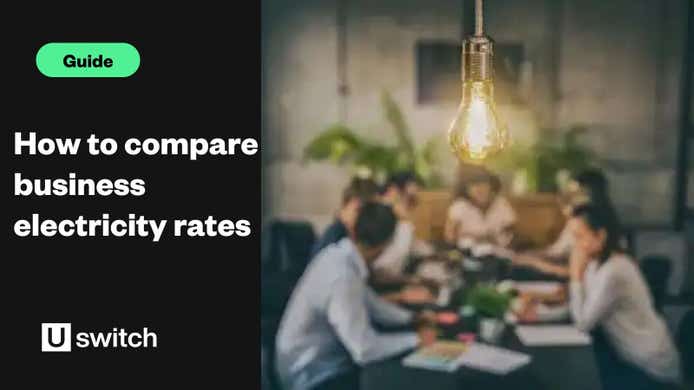Why switch business energy provider?
One of the most important things about running any type of business is keeping running costs to a minimum. One easy way to keep overheads low is to make sure you’re paying a fair price for your business gas and electricity bills.
Just like domestic energy tariffs, business electricity and gas contracts often rise in price automatically when the initial fixed period comes to an end. That’s why it’s important to check whether you’re paying more than you need to for your business energy plan. If there’s a cheaper deal out there, it’s simple to switch providers.
How to switch business electricity and gas providers
From comparing business energy prices to deciphering business energy contracts to comparing business energy brokers, Uswitchforbusiness can demystify the process of switching business energy tariffs.
The easiest way to compare business energy deals is to use a business energy broker like Uswitchforbusiness. Instead of contacting suppliers directly to check rates, taking note of each supplier’s best deals, your broker can do this for you on your behalf. Here’s how to switch business energy using a broker:
Step 1: Get to know your energy contract
The first step in being able to compare business energy suppliers and switch your business electricity or gas plans is to track down your energy contract.
This contract will tell you important information about your business energy rates and how to compare business energy prices per kWh when the contract ends.
You can start comparing and arranging a switch up to six months before your contract ends. This will give you time to review different plans on the market and take time choosing the right one for your business.
If you can’t track down your contract, you should be able to find the same info on a recent energy bill.
Step 2: Find a business energy bill
Now that you know where you stand in relation to your current company energy contract — including what you’re paying and when it ends — you are ready to compare deals.
For this you’ll need a recent bill. This commercial energy bill contains the following items:
Your unit rates and standing charge
Your consumption/how much energy you use annually
Your meter numbers
Your contract end date
Your contract’s notice period (when you have to tell your supplier you’re leaving).
If you are not the business owner, you will also need the permission of the owner to take responsibility of the contract change. You will simply need to confirm that you have this authority at the time of switching.
Step 3: Contact a broker
The next step in switching energy providers is to contact a broker. One of the easiest ways to do this is to use a service like Uswitchforbusiness. Simply enter your business postcode and the details you gathered earlier, and we’ll compare the energy market for you.
We’ll contact you for a 5-10 minute call to discuss your options and find a new business energy contract that suits your needs.
How business energy brokers work
Business energy brokers are specialised intermediaries who work with both the business energy consumers and the energy suppliers.
One key difference between domestic and business energy switching is that using a service like an energy broker is not free.
Energy brokers charge customers in a few different ways; the most common method being a commission, but also via a share of the savings or up front.
Taking the commission method as an example, this is how your energy broker is likely to work:
Once a broker is contacted by a business energy consumer, the broker in turn contacts suppliers, requesting prices that include his or her commission per kWh — .04 p/kWh for example.
The kWh unit rate the consumer sees includes this commission, and the broker invoices the supplier directly based on the consumption of the consumer.
Because the commission is paid via the supplier, it is common for businesses to think that they their broker works for free. This is not the case, so be sure to find out what your broker’s commission rate is.
Step 4: Confirm your business energy switch
Once your chosen energy broker is on the case using the information from your energy bill, they'll come back to you with a selection of deals from different suppliers.The broker should be able to answer your questions and apply their expertise, but it’s ultimately your decision —make sure you ask questions and understand all aspects of the tariff before committing.The broker then confirms the switch with your chosen supplier and you’ll be provided with a contract by email. Once you’ve agreed the contract, it will commence the day after your current tariff ends.
Post-switch support
The broker should take care of any administrative tasks, such as ensuring the go-live date goes as planned, and when your new contract is up, he or should contact you again to review your rates.
Get started below.
Save money on your business energy
Compare prices from trusted UK business energy suppliers and get your next business energy deal in minutes.
Understanding business energy contracts
The two prices you need to focus on when you compare business electricity and gas quotes is the unit cost and standing charge:
Unit cost: This is the price you pay per unit of energy (kWh)
Standing charge: This is a daily charge that helps with the maintenance of the national grid and the cost of transporting energy direct to your business
There are five types of energy contracts that you will be choosing from when switching your business energy supply:
1. Fixed term contract: These contracts have a fixed price on the per unit (kWh) cost for the duration of the contract. The total you pay per month will still vary as this depends on how much energy you use - the cost per unit will not vary though.
2. Variable-rate contract: On variable business energy rate contracts the cost per unit will vary throughout the duration, and will often be linked to market activity, such as when demand is high the cost per unit goes up, and vice versa.
3. Deemed rate contract: The deemed rate is what your supplier will move you onto if you fail to agree a new contract or if you move into a new premises and start using gas or electricity (or both) without an energy contract in place. A deemed rate is also known as an out-of-contract rate tariff, and has more expensive rates.
4. 28-day contract: A 28-day contract is for businesses that haven’t switched since the energy market was deregulated.
5. Rollover contract: If you failed to give your supplier adequate notice of your plans to move to a different supplier, then they will rollover your contract.



